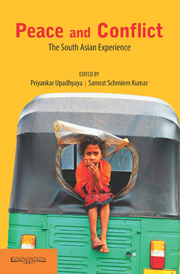Book contents
- Frontmatter
- Contents
- Foreword
- Preface
- Introduction
- 1 Conflict Resolution and Peacebuilding: Ideas, Approaches and Debates
- 2 Changing Perspectives on Peace Studies in South Asia
- 3 Peace Pedagogies in South Asia: Interreligious Understanding
- 4 Responses of Communities to Social Tension
- 5 Plurality of Peace, Non-violence and Peace Works in India
- 6 Education and Culture of Peace: Engaging with Gandhi
- 7 Structural Violence and Human Security: Gandhi's Visions
- 8 Women and the Peace Process in Nepal
- 9 Quest for Peace and Justice in Pakistan: Lawyers' Non-violent Resistance
- 10 Antinomies of Democracy and Peace in Nepal
- 11 Post-armed Conflict Trajectories in Sri Lanka
- 12 Environmental Security and Conflict in Bangladesh: Nature, Complexities and Policies
- Contributors
- Bibliography
- Index
12 - Environmental Security and Conflict in Bangladesh: Nature, Complexities and Policies
Published online by Cambridge University Press: 05 October 2014
- Frontmatter
- Contents
- Foreword
- Preface
- Introduction
- 1 Conflict Resolution and Peacebuilding: Ideas, Approaches and Debates
- 2 Changing Perspectives on Peace Studies in South Asia
- 3 Peace Pedagogies in South Asia: Interreligious Understanding
- 4 Responses of Communities to Social Tension
- 5 Plurality of Peace, Non-violence and Peace Works in India
- 6 Education and Culture of Peace: Engaging with Gandhi
- 7 Structural Violence and Human Security: Gandhi's Visions
- 8 Women and the Peace Process in Nepal
- 9 Quest for Peace and Justice in Pakistan: Lawyers' Non-violent Resistance
- 10 Antinomies of Democracy and Peace in Nepal
- 11 Post-armed Conflict Trajectories in Sri Lanka
- 12 Environmental Security and Conflict in Bangladesh: Nature, Complexities and Policies
- Contributors
- Bibliography
- Index
Summary
Introduction
The environmental issues are generally treated as ‘Non-Traditional Security’ (NTS) threats as they do not appear to be a direct driver of conflict. However, the conflict inducing portents of environmental degradation has lately assumed critical salience in Peace and Conflict Studies. In this chapter the issue of environmental security and its portents arising out of conflict are analysed in the context of Bangladesh. The chapter discusses the various dimensions of conflict generated by environmental insecurity. It examines the practical ramifications generated by the environmental security threats to Bangladesh and its repercussions in triggering conflicts and violence. We know that the rise of the sea level, unmanaged floods, drought and climate-induced disasters resulted in resource scarcity thereby leading to competition, which in turn, appears to have caused security complexity and conflicts. This chapter endeavours to address this complex situation of environmental insecurity and conflict in Bangladesh with some policy recommendations to manage the conflict and promote environmental peacebuilding and ecological sustainability.
Two decades ago, Robert D. Kaplan cautioned that ‘the political and strategic impact of surging populations, spreading disease, deforestation and soil erosion, water depletion, air pollution, and, possibly rising sea levels in critical, overcrowded regions like the Nile Delta and Bangladesh will prompt mass migrations and incite group conflict’ (Kaplan 1994). In addition to traditional security threats, the world community after the Cold War has confronted with new types of problems such as human rights violation, economic crisis, environmental degradation, resource depletion, drug trafficking, epidemics, crimes and social injustices (Baldwin 1997).
- Type
- Chapter
- Information
- Peace and ConflictThe South Asian Experience, pp. 221 - 236Publisher: Foundation BooksPrint publication year: 2014



